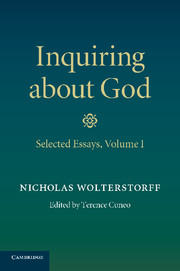Book contents
- Frontmatter
- Contents
- Editor's introduction
- Acknowledgments
- Introduction
- 1 Analytic philosophy of religion: retrospect and prospect
- 2 Is it possible and desirable for theologians to recover from Kant?
- 3 Conundrums in Kant's rational religion
- 4 In defense of Gaunilo's defense of the fool
- 5 Divine simplicity
- 6 Alston on Aquinas on theological predication
- 7 God everlasting
- 8 Unqualified divine temporality
- 9 Suffering love
- 10 Is God disturbed by what transpires in human affairs?
- 11 The silence of the God who speaks
- 12 Barth on evil
- 13 Tertullian's enduring question
- Bibliography
- Index
6 - Alston on Aquinas on theological predication
Published online by Cambridge University Press: 04 May 2010
- Frontmatter
- Contents
- Editor's introduction
- Acknowledgments
- Introduction
- 1 Analytic philosophy of religion: retrospect and prospect
- 2 Is it possible and desirable for theologians to recover from Kant?
- 3 Conundrums in Kant's rational religion
- 4 In defense of Gaunilo's defense of the fool
- 5 Divine simplicity
- 6 Alston on Aquinas on theological predication
- 7 God everlasting
- 8 Unqualified divine temporality
- 9 Suffering love
- 10 Is God disturbed by what transpires in human affairs?
- 11 The silence of the God who speaks
- 12 Barth on evil
- 13 Tertullian's enduring question
- Bibliography
- Index
Summary
In the 1980s, William Alston published a number of important papers in which he argued that it is possible to affirm something true of God by speaking literally.
The topic was not one that just happened to pique his curiosity. What drew his attention to the topic, and made it important, was the fact that, as he put it in the earliest of the articles, “the impossibility of literal talk about God has become almost an article of faith for theology in this century.”
I share Alston's reason for regarding the issue as important. But I have a more specific interest as well. In my Divine Discourse I claimed that it is philosophically tenable to hold that it is literally true of God that God speaks – commands, asserts, asks, promises, and the like. What I had in mind by “speaking” was the performance of illocutionary acts. Though I myself see nothing impossible in God's performing locutionary acts, nonetheless the traditional claim or assumption that God cannot literally speak very much depended on not having available J. L. Austin's distinction between locutionary and illocutionary acts; the traditional argument, that since God has no body, God cannot literally speak, does not work if it is illocutionary acts that one has in mind. What I did not do is mount a more general argument to the effect that one can predicate of God what is true of God by speaking literally.
- Type
- Chapter
- Information
- Inquiring about God , pp. 112 - 132Publisher: Cambridge University PressPrint publication year: 2010



